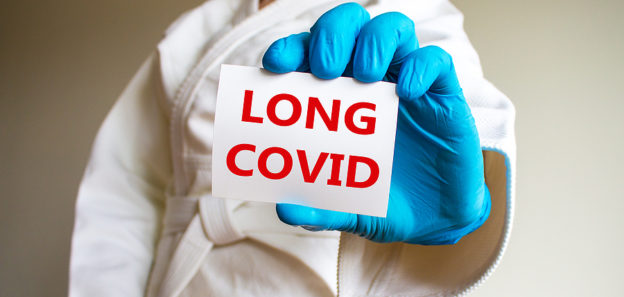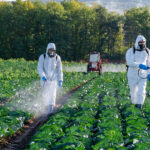By David Blyweiss, M.D., Advanced Natural Wellness
October 22, 2021
Not long ago, we thought that once you recovered from Covid-19, you were done with it. Now we’re finding that, even after you no longer have the virus, you can still suffer long-term effects – or “long COVID”.
And it turns out long COVID is much more common than we once thought. We’re now learning that over one in three COVID-19 patients have long Covid three to six months after their original diagnosis.
What’s going on here? If the virus is no longer in your body, how can you still have symptoms?
Well, it might not exactly be COVID that’s causing those long-haul symptoms. Instead, it appears that COVID reactivates an old virus that about 95% of people carry in their body.
It’s called the Epstein Barr virus (EBV). Most of us had exposure to it when we were younger and had a more robust immune system. Most EBV infections weren’t even noticeable unless you ended up with mononucleosis. Then you would end up with chronic fatigue – almost a sleeping sickness – that kept you in your bed for a few weeks.
Open your arteries, improve blood flow for a new health miracle...
Did you know your circulatory system has over 60,000 miles of arteries, veins and other blood vessels, if stretched end to end?
But as you age, your blood vessels undergo changes, which may cause them to stiffen, thicken and get clogged.
GOOD NEWS! Doctors have now identified a “Miracle Molecule” inside your arteries that helps OPEN your arteries and IMPROVE blood flow.
It’s what Dr. Valentin Fuster calls it, "One of the most important discoveries in the history of cardiovascular medicine."To you, that means...
- Healthy blood pressure
- Sharper mind and memory
- Skyrocketing energy and muscular strength
- Increased pleasure and passion in the bedroom
- Improved circulation to every cell and organ in your body
Go here to discover a new natural way to significantly boost the levels of this miracle molecule in YOUR body NOW!
When you get COVID, it can reactivate the Epstein Barr virus, even if you never had symptoms of it. In fact, a recent analysis found that over 73 percent of COVID-19 patients who experienced long COVID symptoms also tested positive for EBV reactivation.
It’s sort of like shingles that appear in people who had chicken pox as a kid. It hides in your body and waits for you to become vulnerable. And because you have EBV in your system, when you get COVID it can get reactivated and it’s out in the open again.
Having pre-existing conditions like diabetes, lung disease, morbid obesity – or because your immune system has been shot over the years by EBV – all make you even more vulnerable.
This is why it’s more important than ever to keep your immune system strong. And that’s not what the government is telling people to do.
Boost the Immune System that Lives in Your Gut
We’re going to get viruses. Even the flu can reactivate EBV. So you have to support your immune system.
At minimum, your body needs vitamins A, C, D and E, as well as folate, iron, zinc and selenium. These are the top nutrients to keep in your body.
The World's Quickest Solution for Ending Prostate and Urinary Misery
This has recently been revealed to be one of the only real breakthroughs in prostate health.
The seeds of a strange fruit (sometimes called "Chinese Apples") hold powerful phytonutrients that are a revolution in prostate health.
In fact, UCLA and Veterans Administration research have now proved this to be true.
Not only that, but it may be the worlds quickest solution for ending prostate misery.
Simply stated, these phytonutrients represent a huge step beyond beta sitosterol, saw palmetto, and other phytosterols alone.
Simply click HERE if you want to have fast prostate relief...restful, uninterrupted sleep...no more constant "urges to go"...enhanced virility...and optimal prostate support for life.
Taking your vitamins is important. But the foods you choose on a daily basis can have a huge impact on your immune health. That’s because most of your immune system is actually found in your gut.
But consider this. What was once just called “food” is now called “organic food.” These days, people are exposed to many more unhealthy food options than in years past. And it’s become abundantly clear that this modern diet now referred to as the Anthropocene diet is damaging the immune system.
So think about how the foods you eat impact your microbiome. You want to eat a diet that will make your microbiome happy and healthy so it can strengthen your immune system. This includes things like…
- Eating 85% organic plant-based foods from all colors of the rainbow. This will keep your microbiome happy and boost your immune response.
- Avoiding conventionally raised meats and farm raised fish. Instead, fill in the remaining 15% of your diet with organic grass-fed meat, pastured chicken and wild-caught fish.
- Reducing your intake of omega-6 fatty acids while increasing your intake of omega-3 fatty acids. Eating more omega-3’s and less omega-6s promotes a strong immune response and decreased inflammation. Inflammatory omega-6s are generally found in vegetable oils and packaged foods.
- Adding more probiotic foods like kimchi, tempeh and natto to your diet. Fermented beverages, like kombucha and kefir act as probiotics, too.
- Staying away from foods that are sugary, salty or processed. Skip GMO foods and foods that contain gluten. These are inflammatory and can weaken your immune system.
When it comes to protecting your immune system, food really is the best medicine.
Don’t Let Viruses Hijack Your Mitochondria
We also have to think about the mitochondria. Viruses like Epstein Barr and COVID love to hijack these energy factories. So you want to keep both your immune system and your mitochondria in tip-top shape.
There are several supplements that can help support your mitochondria.
I like alpha lipoic acid. It’s both fat and water soluble. So it can go into places in the body that are both lipophilic and hydrophilic. But a special thing about that is that it goes directly to the mitochondria. You want to look for R-lipoic acid. It’s the natural version. Take at least 150 mg twice a day.
Resveratrol is also great for mitochondrial support. I like it for its anti-inflammatory properties. It promotes mitochondrial biogenesis helps get rid of damaging oxidative stress in the mitochondria. There’s also resveratrol’s distant cousin, pterostilbine. It’s like resveratrol but your body doesn’t metabolize it as quickly. So it stays in your body longer. That actually makes it more powerful than resveratrol. The dosage depends upon the standardized dose, but you want to take each twice a day.
You can get another level of protection by taking CoQ10. It improves the energy efficiency of the mitochondria, helps your surviving mitochondria make more energy, and activates mitochondrial biogenesis. I like at least 100 mg two times a day if you’re going to try and improve your mitochondrial function. Look for the ubiquinol form.
And don’t forget to stay physically active and get enough sleep!
SOURCES:
Taquet M, Dercon Q, Luciano S, Geddes JR, Husain M, Harrison PJ. Incidence, co-occurrence, and evolution of long-COVID features: A 6-month retrospective cohort study of 273,618 survivors of COVID-19. PLoS Med. 2021 Sep 28;18(9):e1003773.
Gold JE, Okyay RA, Licht WE, Hurley DJ. Investigation of Long COVID Prevalence and Its Relationship to Epstein-Barr Virus Reactivation. Pathogens. 2021;10(6):763
Myles IA. Fast food fever: reviewing the impacts of the Western diet on immunity. Nutr J. 2014;13:61.
Chaari A, Bendriss G, Zakaria D, McVeigh C. Importance of Dietary Changes During the Coronavirus Pandemic: How to Upgrade Your Immune Response. Front Public Health. 2020;8:476.
Liu J. The effects and mechanisms of mitochondrial nutrient alpha-lipoic acid on improving age-associated mitochondrial and cognitive dysfunction: an overview. Neurochem Res. 2008 Jan;33(1):194-203.
Ungvari Z, Sonntag WE, de Cabo R, Baur JA, Csiszar A. Mitochondrial protection by resveratrol. Exerc Sport Sci Rev. 2011;39(3):128-132.
Hernández-Camacho JD, et al. Coenzyme Q10 Supplementation in Aging and Disease. Front. Physiol. . 2018;9:44.







